Hugo Nomination Thoughts, 2018
Time for my annual post on what I’m thinking about for Hugo nominations. As ever, I’ll caution that I have read a lot of short fiction, but that I am less up on the other categories. I have seen a fair quantity of movies, too, however.
Let me reiterate something I said last year – though I participate with a lot of enjoyment in Hugo nomination and voting every year, I am philosophically convinced that there is no such thing as the “best” story – “best” piece of art, period. This doesn’t mean I don’t think some art is better than other art – I absolutely do think that. But I think that at the top, there is no way to draw fine distinctions, to insist on rankings. Different stories do different things, all worthwhile. I can readily change my own mind about which stories I prefer – it might depend on how important to me that “thing” they do is (and of course most stories do multiple different things!) – it might depend on my mood that day – it might depend on something new I’ve read that makes me think differently about a certain subject. And one more thing – I claim no special authority of my own. I have my own tastes, and indeed my own prejudices. So too does everyone else. I have blind spots, and I have things that affect me more profoundly than they might affect others. I’ve also read a lot of SF – and that changes my reactions to stories as well – and not in a way that need be considered privileged.
Anyway, as ever, in the lists below, I’ll suggest somewhere between 3 and 8 or so items that might be on my final ballot. Those will be in no particular order. And the other stories I list will all really be about as good – and I might change my mind before my ballot goes in.
The other obvious point to make is that the great bulk of these stories are those that I plan to include in my yearly anthology. There are a few that didn’t make it, for reasons of length, contractual situation, balance, or even that I might have missed a story by the deadline for the book.
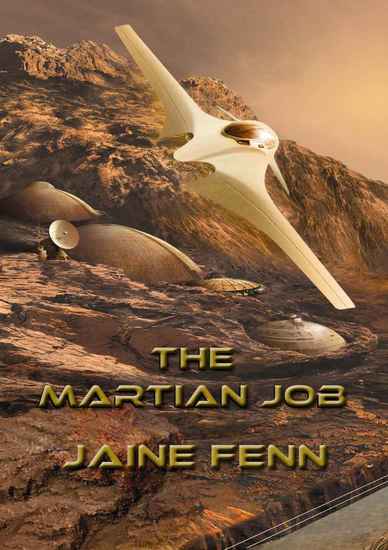 |
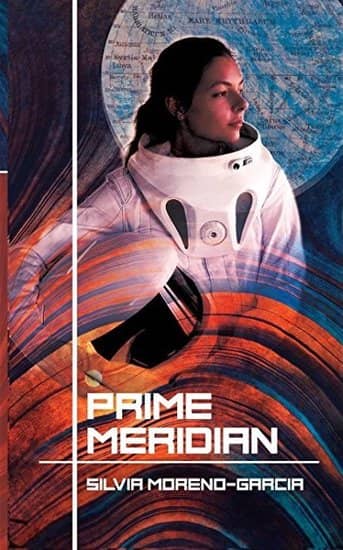 |
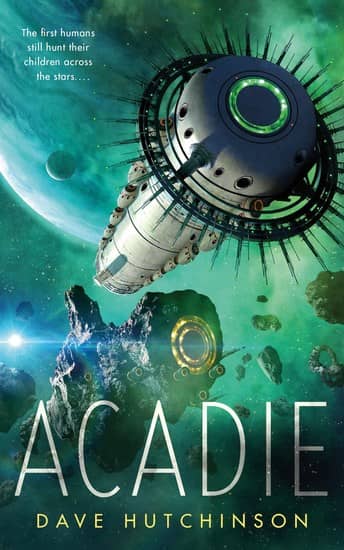 |
Short Fiction
Novella
I thought this was a strong year for novellas, and the following is my long list of potential nominees:
Peter Beagle, In Calabria (Tachyon)
Damien Broderick, “Tao Zero” (Asimov’s, 3-4/17)
Lois McMaster Bujold, The Prisoner of Limnos (Spectrum)
Jaine Fenn, The Martian Job (NewCon Press)
Michael F. Flynn, “Nexus” (Analog, 3-4/17)
Kathleen Ann Goonan, “The Tale of the Alcubierre Horse” (Extrasolar)
Karen Heuler, In Search of Lost Time (Aqueduct)
Dave Hutchinson, Acadie (Tor.com Publishing)
Alexander Jablokov, “How Sere Picked Up Her Laundry” (Asimov’s, 7-8/17)
Marc Laidlaw, “Stillborne” (F&SF, 11-12/17)
Silvia Moreno-Garcia, Prime Meridian (Innsmouth Free Press)
David Erik Nelson, “There Was a Crooked Man He Flipped a Crooked House” (F&SF, 7-8/17)
Alec Nevala-Lee, “The Proving Ground” (Analog, 1-2/17)
KJ. Parker, Mightier Than the Sword (Subterranean)
Sarah Pinsker, “And Then There Were N – One” (Uncanny, 3-4/17)
Rachel Pollack, “Homecoming” (F&SF, 1-2/17)
R. Garcia y Robertson, “The Girl Who Stole Herself” (Asimov’s, 7-8/17)
Christopher Rowe, “Telling the Map” (Telling the Map)
Sofia Samatar, “Fallow” (Tender)
Jeremiah Tolbert, “The Dragon of Dread Peak” (Lightspeed, 10/17)
Cynthia Ward, ”The Adventure of the Incognita Countess” (Aqueduct)
Martha Wells, All Systems Red (Tor.com Publishing)
Of these stories – none of which would disappoint me if they won the Hugo – my four favorites, in no particular order, are:
- Sofia Samatar, “Fallow” – Samatar’s debut collection, Tender (Small Beer Press), is absolutely essential. There are two new stories, this novella, and a short story, “An Account of the Land of Witches,” and both are outstanding. “Fallow” is the story of three different sort of rebels on a struggling colony, apparently inhabited by an Amish-like sect, trying to maintain their identity while hoping for a return to an ecologically ruined Earth when it becomes potentially re-inhabitable. But that doesn’t get at what’s so cool about it — beautiful writing, haunting characters, and a real sense of mystery and strangeness.
- Sarah Pinsker, “And Then There Were (N – One)” – A story about a convention of alternate Sarah Pinskers, complete with a murder. It is warmly told – funny at time, certainly the milieu is familiar to any SF con-goer. But it’s dark as well – after, there’s a murder – and it intelligently deals with issue of identity and contingency.
- Silvia Moreno-Garcia, Prime Meridian – This story came kind of out of left field – not exactly so, as Moreno-Garcia has certainly done some first-rate writing, but this was published to begin with as an ebook available to supporters of an Indiegogo campaign. It will be more generally available in 2018 (including in at least one Best of the Year volume). And it’s tremendous work, mixing a convincing portrayal of near future Mexico City with dreams of trips to Mars – both the protagonist’s hopes to be an actual colonist, and a fading movie star’s memories of a movie she made about Mars.
- Kathleen Ann Goonan – “The Tale of the Alcubierre Horse” – just to prove you don’t have to be a woman whose first name starts with S! This is an ambitious and moving story of the first starship, which ends up crewed by a group of super-intelligent children and an older woman.
The current leaders for the fifth position on my ballot are Broderick’s “Tao Zero,” a rather crazy sort of superscientific tale, lots of fun; Hutchinson’s Acadie, a twisty story of the true nature of an utopian seeming space habitat; Tolbert’s “The Dragon of Dread Peak,” also lots of fun, about a group of teens exploring a dangerous magical rift in their city; and Wells’ All Systems Red, an often funny, and quite action-filled, story of an AI security android who really doesn’t like humans all that much.
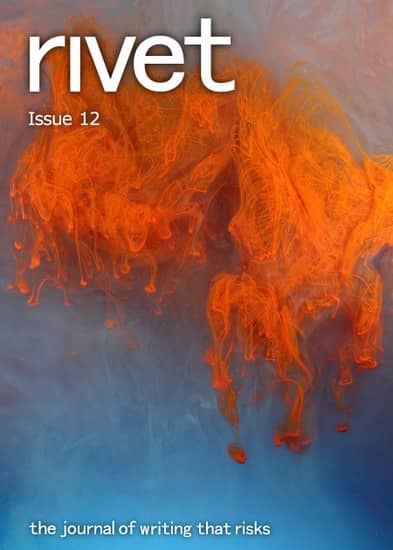 |
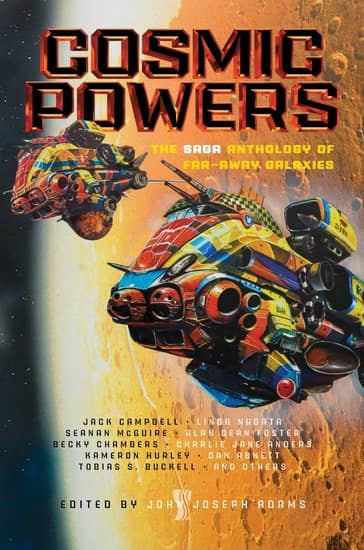 |
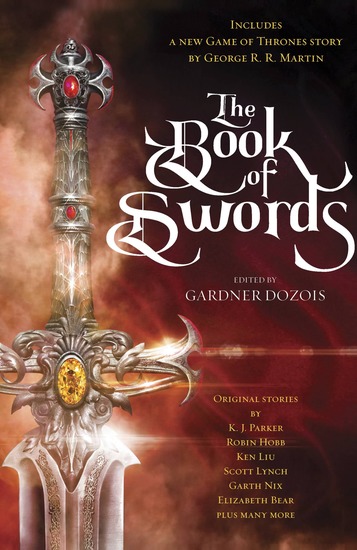 |
Novelette
This is my long list of novelettes I’ve considered for nomination, largely the list of those I put in the Recommended Reading section of my Locus reviews (with a few additions).
Daniel Abraham, “The Mocking Tower” (The Book of Swords)
Nina Allan, “Neptune’s Trident” (Clarkesworld, 6/17)
Charlie Jane Anders, “A Temporary Embarrassment in Spacetime” (Cosmic Powers)
G. V. Anderson, “I Am Not I” (F&SF, 7-8/17)
Dale Bailey, “Come As You Are” (Asimov’s, 5-6/1)
R.S. Benedict, “My English Name” (F&SF, 5-6/17)
Maggie Clark, “Belly Up” (Analog, 7-8/17)
Samuel R. Delany, “The Hermit of Houston” (F&SF, 9-10/17)
Christopher East, “An Inflexible Truth” (Lightspeed, 8/17)
Greg Egan, “The Discrete Charm of the Turing Machine” (Asimov’s, 11-12/17)
Greg Egan, “Uncanny Valley” (Tor.com, 8-17)
Kate Elliott, “’I am a Handsome Man’ said Apollo Crow” (The Book of Swords)
Max Gladstone, “Crispin’s Model” (Tor.com, 10/17)
Theodora Goss, “Come See the Living Dryad” (Tor.com, 3/17)
Robert Grossbach, “Driverless” (F&SF, 3-4/17)
Austen Habershaw, “The Masochist’s Assistant” (F&SF, 7-8/17)
Maria Dahvana Headley, “Black Powder” (The Djinn Falls in Love)
Simone Heller, “How Bees Fly” (Clarkesworld, 2/17)
Chi Hui, “Rain Ship” (Clarkesworld, 2/17)
Xia Jia, “Goodnight Melancholy” (Clarkesworld, 3/17)
Mary Robinette Kowal, “The Worshipful Society of Glovers” (Uncanny, 7-8/17)
Yoon Ha Lee, “Extracurricular Activities” (Tor.com, 2/17)
Yoon Ha Lee, “The Chameleon’s Gloves” (Cosmic Powers)
Will McIntosh, “Soulmates.com” (Asimov’s, 3-4/17)
Sean McMullen, “The Influence Machine” (Interzone, 3-4/17)
David Erik Nelson, “Whatever Comes After Calcutta” (F&SF, 11-12/17)
Suzanne Palmer, “Books of the Risen Sea” (Asimov’s, 9-10/17)
Suzanne Palmer, “The Secret Life of Bots” (Clarkesworld, 9/17)
Susan Palwick, “Remote Presence” (Lightspeed, 4/17)
K.J. Parker, “Message in a Bottle” (The Djinn Falls in Love)
Tony Pi, “That Lingering Sweetness” (Beneath Ceaseless Skies, 4/27/17)
Sarah Pinsker, “Wind Will Rove” (Asimov’s, 9-10/17)
Vina Jie-Min Prasad, “A Series of Steaks” (Clarkesworld, 1/17)
Robert Reed, “Leash on a Man” (F&SF, 9-10/17)
Robert Reed, “Dunnage of the Soul” (F&SF, 1-2/17)
Alastair Reynolds, “Night Passage” (Infinite Stars)
Kenneth Schneyer, “Keepsakes” (Analog, 11-12/17)
Hanus Seiner, “Hexagrammaton” (Tor.com, 5/17)
Lavie Tidhar, “Waterfalling” (The Book of Swords)
Genevieve Valentine, “Intro to Prom” (Clarkesworld, 10/17)
Will Waller, “Phantom Architecture” (Rivet Journal, Fall/17)
Peter Watts, “ZeroS” (Infinity Wars)
Alex Wells, “Angel of the Blockade” (Tor.com, 9/17)
The top candidates for my ballot are:
- Yoon Ha Lee, “Extracurricular Activities” (Tor.com, 2/17) – a quite funny, and quite clever, story concerning the earlier life of a very significant character in Lee’s first novel, Ninefox Gambit. Shuos Jedao is an undercover operative for the Heptarchate, assigned to infiltrate a space station controlled by another polity, and to rescue the crew of a merchanter ship that had really been heptarchate spies, including an old classmate.
- Suzanne Palmer, “The Secret Life of Bots” (Clarkesworld, 9/17) – a very old bot on a battered Ship trying to stop an alien attack on Earth. It shows a surprising amount of initiative – even, one might say, imagination – in dealing with the Incidental. Might that not be useful in dealing with the aliens? Or might bots have their own ideas about their own place?
- Samuel R. Delany, “The Hermit of Houston” (F&SF, 9-10/17) – This is set some time in the future, in a strange future, hard to get a grip on (the best kind), from one angle seeming sort of pastoral utopia, from other angles utterly horrifying. It’s mostly about the narrator’s long-time lover, an older man named Cellibrex (sometimes), and about the hints he lets drop of some of the true nature of this future. There is extremely interesting treatment of gender, and of politics, and of law and custom and memory – and I don’t get everything that’s going on in the story, in a good way.
- Will McIntosh, “Soulmates.com” (Asimov’s, 3-4/17) — The story is scary, and morally provocative, and resolved with honesty. It’s about a man using an AI service to meet potential partners, and finding a really interesting woman – but somehow she never wants to meet in real life. Of course, she’s an AI – and the protagonist doesn’t react very well to that revelation.
- Peter Watts, “ZeroS” (Infinity Wars) — posits a technology that turns soldiers into non-conscious actors – for it turns out the unconscious has spooky abilities. Which are pretty scary for the humans who end up sort of “riding” their unconscious – especially when they learn what their “zombie” selves are capable of. For an extra fillip of spookiness, the story is told from the POV of a soldier who actually died, and who has been resurrected by this particular technology – at an increasingly horrible price.
- Hanus Seiner, “Hexagrammaton” (Tor.com, 5/17) – A man serves as a sort of intermediary to Europans who have survived an alien virus, guiding a young woman to visit her father when he realizes she is infected with the virus – and with a purpose. Another thread shows a man – the same man? – in prison – and somehow both these threads seem to turn on understanding the alien language, and its multiple meanings for the same sentence. The linguistic weirdness reminded me of Ted Chiang’s “Story of Your Life,” and though it’s not THAT good, it’s pretty weird cool stuff.
The other stories on the verge are Kenneth Schneyer’s “Keepsakes,” Alastair Reynolds’ “Night Passage,” Daniel Abraham’s “The Mocking Tower,” and Kate Elliott’s “’I am a Handsome Man’ said Apollo Crow.”
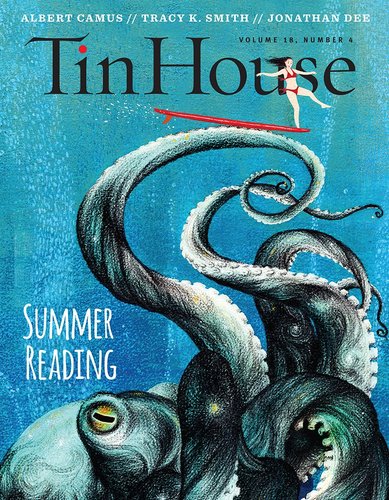 |
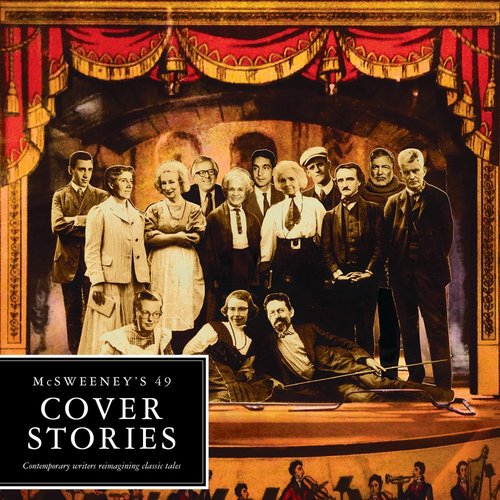 |
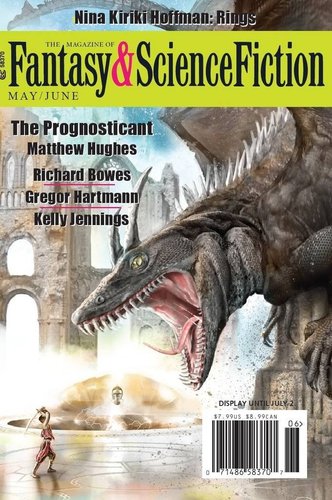 |
Short Story
Another very long list, a set of very worthwhile short stories.
Charlie Jane Anders, “Cake Baby” (Lightspeed, 11/17)
Charlie Jane Anders, “Don’t Press Charges and I Won’t Sue” (Boston Review, Global Dystopias)
Tim Akers, “A Death in the Wayward Drift” (Interzone, 3-4/17)
Eleanor Arnason, “Daisy” (F&SF, 3-4/17)
Kelly Barnhill, “Probably Still the Chosen One” (Lightspeed, 2/17)
Tobias Buckell, “Zen and the Art of Starship Maintenance” (Cosmic Powers)
Tobias Buckell, “Shoggoths in Traffic” (Patreon, 4/17)
Rebecca Campbell, “The Fall of the Mundaneum, (Beneath Ceaseless Skies, 9/28/17)
C. S. E. Cooney, “Though She Be But Little” (Uncanny, 9-10/17)
Tina Connolly, “Pipecleaner Sculptures and other Necessary Work” (Uncanny, 11-12/17)
John Crowley, “This is Our Town” (Totalitopia)
John Crowley, “Spring Break” (New Haven Noir)
Scott Dalrymple, “Marcel Proust, Incorporated” (Lightspeed, 6/17)
J. R. Dawson, “Marley and Marley” (F&SF, 11-12/17)
Kate Dollarhyde, “Lamplighter’s Eve” (Lackington’s, Fall/17)
Andy Dudak, “Cryptic Female Choice” (Interzone, 7-8/17)
Tom Greene, “Necessary Illusions” (Analog, 1-2/17)
Giovanni de Feo, “Ugo” (Lightspeed, 9/17)
Jonathan Edelstein, “Of Letters They Are Made” (Beneath Ceaseless Skies, 6/22/17)
Kendra Fortmyer, “Octopus vs. Bear” (Lightspeed, 5/17)
Karen Joy Fowler, “Persephone of the Crows” (Asimov’s, 5-6/17)
A. T. Greenblatt, “A Place to Grow” (Beneath Ceaseless Skies, 5/11/17)
Nina Kiriki Hoffman, “Rings” (F&SF, 5-6/16)
S. L. Huang, “Time Travel is Only for the Poor” (Analog, 11-12/17)
Kameron Hurley, “The Fisherman and the Pig” (Beneath Ceaseless Skies, 9/28/17)
N. K. Jemisin, “The Evaluators” (Wired, 1/17)
Minsoo Kang, “The Sacrifice of the Hanged Monkey” (Fantastic, POC Take Over)
Alice Sola Kim, “One Hour, Every Seven Years” (McSweeney’s #49)
Matthew Kressel, “Love Engine Optimization” (Lightspeed, 6/17)
Naomi Kritzer, “Paradox” (Uncanny, 5-6/17)
Greg Kurzawa, “Soccer Fields and Frozen Lakes” (Lightspeed, 3/17)
Margo Lanagan, “Not All Ogre” (Singing My Sister Down)
Rich Larson, “An Evening with Severyn Grimes” (Asimov’s, 7-8/17)
Rich Larson, “Cupido” (Asimov’s, 3-4/17)
Emily St. John Mandel, “Mr. Thursday” (Slate, 3/17)
Kate Marshall, “Red Bark and Ambergris” (Beneath Ceaseless Skies, 8/17/17)
Bruce McAllister, “This is for You” (Lightspeed, 5/17)
Maureen McHugh, “Sidewalks” (Omni, Winter/17)
Linda Nagata, “The Martian Obelisk” (Tor.com 7/17)
Ray Nayler, “Winter Timeshare” (Asimov’s, 1-2/17)
Mari Ness, “You Will Never Know What Opens” (Lightspeed, 12/17)
Susan Palwick, “The Shining Hills” (Lightspeed, 8/17)
Dominica Phetteplace, “Oracle”(Infinity Wars)
Sarah Pinsker, “The Ones Who Know Where They Are Going” (Asimov’s, 3-4/17)
Vina Jie-Min Prasad, “Fandom for Robots” (Uncanny, 9-10/17)
Lettie Prell, “Emergency Protocol” (Analog, 9-10/17)
Madeline Ray, “Montreal 2014” (Mothership Zeta, 1/17)
Robert Reed, “The Significance of Significance” (Clarkesworld, 7/17)
Ryan Row, “Whatever Knight Comes” (Beneath Ceaseless Skies, 5/25/17)
Sofia Samatar, “An Account of the Land of Witches” (Tender)
Karl Schroeder, “Eminence” (Chasing Shadows)
Gord Sellar, “Focus” (Analog, 5-6/17)
Benjanun Sriduangkaew, “No Pearls as Blue as These” (Beneath Ceaseless Skies, 8/17/17)
Eric Schwitzgebel, “The Turing Machines of Babel” (Apex, 7/17)
Jack Skillingstead, “The Last Garden” (Lightspeed, 2/17)
Michael Swanwick, “Starlight Express” (F&SF, 9-10/17)
Molly Tanzer, “Nine-Tenths of the Law” (Lightspeed, 1/17)
Lavie Tidhar, “The Banffs” (Analog, 5-6/17)
Carrie Vaughn, “I Have Been Drowned in Rain” (Beneath Ceaseless Skies, 4/13/17)
Jamie Wahls, “Utopia LOL?” (Strange Horizons, 6/5/17)
Daniel Wallace, “Sea Girls” (Tin House, Summer/17)
Jo Walton, “A Burden Shared” (Tor.com, 4/17)
Nick Wolven, “Confessions of a Con Girl” (Asimov’s, 11-12/17)
Caroline Yoachim, “Carnival Nine,” (Beneath Ceaseless Skies, 5/11/17)
E. Lily Yu, “The White-Throated Transmigrant” (Tor.com, 6/17)
Alvaro Zinos-Amaro and Adam-Troy Castro, “A Touch of Heart” (Lightspeed, 7/17)
Lots of excellent stories there. I do have some favorites. My nomination list will include five of these, and I have to admit, I don’t know right now which five.
- Maureen McHugh, “Sidewalks” (Omni, Winter/17) – Rosni Gupta is a speech pathologist for Los Angeles County, and her latest case is a woman who speaks nothing but gibberish. Rosni assumes she is perhaps autistic, but on meeting her she realizes that is not the case, and soon learns what the gibberish really is. I’ll leave the secret for the reader to discover – not that it’s particularly a new notion – but the implications are powerful, and the characters are absolutely real.
- Giovanni de Feo, “Ugo” (Lightspeed, 9/17) – About a girl who repeatedly meets a strange boy named Ugo, who claims to know their common future. Eventually he tells her that he experiences “Leaps” through time, when his older self goes into a sort of fugue and travels into his younger mind. The story follows their life, and their love affair, and careers – with the question always as to how it will end, for Ugo’s knowledge of the future only goes so far. There’s an obvious hint of The Time Traveler’s Wife here, but with a somewhat darker tint – and with an ambiguous ending twist. This is a very effective, moving, and thoughtful piece.
- Charlie Jane Anders, “Don’t Press Charges and I Won’t Sue” (Boston Review, Global Dystopias) – This concerns Rachel, who has been confined in an institution to cure her particular personal problem, as the state sees it – her belief that she is a woman, though she was born a boy. Her childhood friend Jeffrey is a functionary at this particular institution. And the method of “cure” is particularly horrific – not that her situation isn’t horrific no matter how the state wished to treat her. Anders has always had the ability to present truly agonizing situations with a superficially comic surface, which only makes the realization of the horror beneath more affecting – and never more so, I think, than in this story.
- Sofia Samatar, “An Account of the Land of Witches” (Tender) – It opens with a lyrical narrative by Arta, a slave who is taken by her master (a merchant) to the Land of Witches, where she learns their magic – or Dream Science – which involves language and the manipulation of time. This is absolutely lovely writing, and the magical system is beautiful. There follows – ever in different well realized voices – a “refutation” of Arta’s account by her angry master; and then a desperate section told by a Sudanese woman trapped back home by visa problems (and local strife) as she tries to research the fragments that make up Arta’s account and her master’s refutation for her degree from a US university; then a lexicon of the witches’ magical language, and then a strange almost mystical account of a journey in search of the Land. This is really striking, original, and mysterious.
- Linda Nagata, “The Martian Obelisk” (Tor.com, 7/17) – set in a future in which a series of disasters, with causes in human nature, in environmental collapse, and in technological missteps, has led to a realization that humanity is doomed. One old architect, in a gesture of, perhaps, memorialization of the species, has taken over the remaining machines of an abortive Mars colony to create a huge obelisk that might end up the last surviving great human structure after we are gone. But her project is threatened when a vehicle from one of the other Martian colonies (all of which failed) approaches. Is the vehicle’s AI haywire? Has it been hijacked by someone else on Earth? The real answer is more inspiring – and if perhaps just a bit pat, the conclusion is profoundly moving.
- Karen Joy Fowler, “Persephone of the Crows” (Asimov’s, 5-6/17) – is just wrenchingly brilliant, using apparently true (in story terms) fantastical elements in service of character examination, and in so doing resolves itself without really resolving any of the questions the fantastical elements might inspire. Which, to a devoted reader of the fantastic can be in a way disappointing. But on its own terms I think this story delivers. Polly is a 10-year old girl at who meets another girl who claims to have seen a real fairy. Polly is envious of the other girl for lots of reasons – money is one, parents are another, and Polly’s wishes for something better in her life only intensify that night – until the drive home, when her drunken father loses control of the car – and things get strange. Be careful what you wish for, perhaps? Though that sounds a bit facile – the story doesn’t quite go where you expect it to, and in the end we have a sharp portrayal of its main character and a sad look at her perception of her family.
- Tobias Buckell, “Zen and the Art of Starship Maintenance” (Cosmic Powers) – A starship maintenance robot, after a successful battle, by happenstance rescues a CEO of the enemy fleet, and finds himself inveigled/bribed/coerced into rendering assistance. The story turns on the complex intersection of intriguing speculation about AIs and identity, economics, contract law, moral law, free will and orbital mechanics. In other words, really cool stuff.
- Tobias Buckell, “Shoggoths in Traffic” (Patreon, 4/17) – is a clever Lovecraftian crime story, in which a couple of people steal (repossess!) a car from a drug dealer and try to take it to Miami – but on the way run into a weird highway exit and a biker magician and – well, you’ll not think of cloverleafs and other traffic patterns in quite the same way after this!
Long Fiction
I use the term “Long Fiction” because we now have three categories that can fit. Best Novel, of course, but also Best Series, as well as the new “Not a Hugo” for Best Young Adult Fiction.
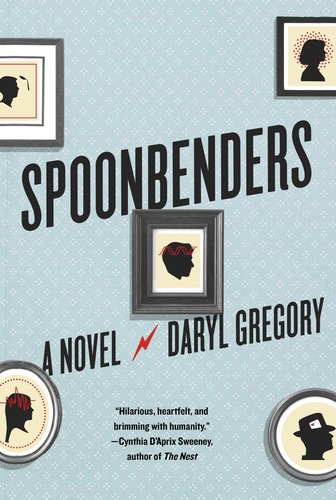 |
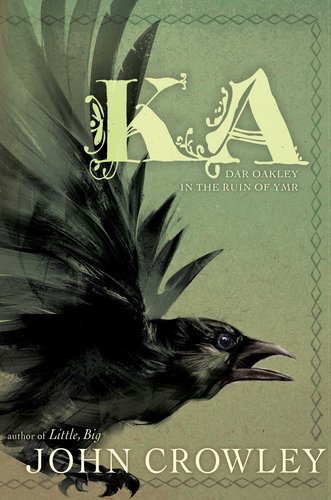 |
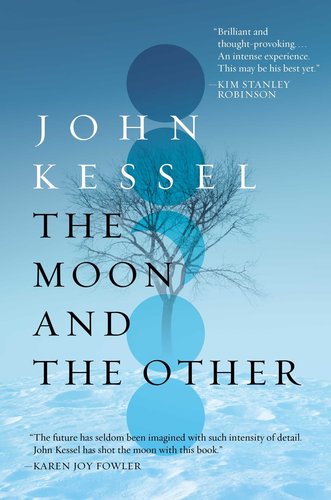 |
Best Novel
Every year I mention that I haven’t read a lot of novels. Maybe I did a bit better this year, however. Already I’ve read the following novels I think are potentially Hugo-worthy:
Spoonbenders, by Daryl Gregory
Ka, by John Crowley
The Strange Case of the Alchemist’s Daughter, by Theodora Goss
The Moon and the Other, by John Kessel
Provenance, by Ann Leckie
Seven Surrenders, by Ada Palmer
The Wrong Stars, by Tim Pratt
Amatka, by Karin Tidbeck
I’ve got a few more novels ready to read real soon: Raven Stratagem, by Yoon Ha Lee (cool that I’ll read that right after John Crowley’s novel about a crow); Six Wakes, by Mur Lafferty; The River Bend, by Kij Johnson; Quillifer, by Walter Jon Williams; and Autonomous, by Annalee Newitz. That doesn’t by any means exhaust the pool of good novels, or potentially good novels, but I only have so much time!
I’m going to put three novels on my tentative nomination list right away. These are the best three 2017 novels I’ve read so far, and I’ll be surprised (and pleased!) if any of the novels I have yet to read surpass them. The leading choices for other two on my ballot right now are The Strange Case of the Alchemist’s Daughter, The Wrong Stars, and Amatka, but there is still time for a new novel to bump one of those, or for me to change my mind. (And, of course, I need to make up my mind between those three anyway!)
So, the top three are, in no particular order (well, alphabetical by author):
- Ka, by John Crowley – the subtitle is “Dar Oakley in the Land of Ymr,” and it’s about a Crow named Dar Oakley, who, upon being nursed to life by an aging man in our near future, tells the man stories of his long life – or series of lives – and his increasing contact with humans and knowledge of the human world (which he calls Ymr). This sounds simple – oh, another talking animal story – and it’s nothing but: beautifully told and wise, with the voice of both the human narrator and of Dar Oakley remarkably well-realized.
- Spoonbenders, by Daryl Gregory – a very funny (and often heartbreaking as well) novel about a family of pyschics – the pater familias is a con man, but his wife and his children (and at least one grandchild) have real (if inconsistent) powers. I was reminded of Michael Chabon, and I was convinced by the portrayal of the Chicago suburbs, where the book is set and where I also grew up. There are multiple love stories, there is a tricky and well-navigated plot, and there is a real and powerful emotional payoff. And, yes, it’s very funny.
- The Moon and the Other, by John Kessel – Set in the 22nd Century on the Moon, centered on the political turmoil in one colony run by the Society of Cousins, in which women hold all political power, on the grounds that men are too violent. (The argument is developed more subtly in the book and in its related stories.) One character (the hero of a previous story) has been exiled and is making a life in another, noticeably patriarchal, society, when he is offered an opportunity to return to his first home. Another character is a woman involved in a Reform movement aimed at giving men in the Society the right to vote. Another character is a charismatic athlete in the Society who wants custody of his son. And who has a very unexpected personal secret. The novel is not drily political, or polemical, at all (though as with most essentially utopian stories, I sensed a bit of bias towards the more utopianish community) – instead it’s actively engaging, very fun reading, very thought-provoking. This is the choice for those who want traditional hard SF.
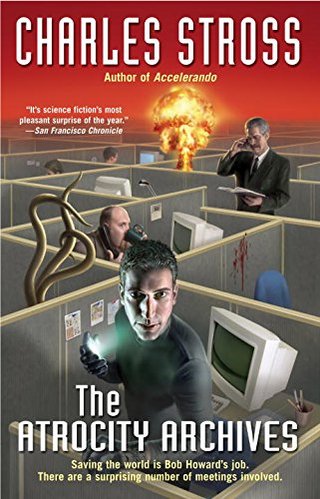 |
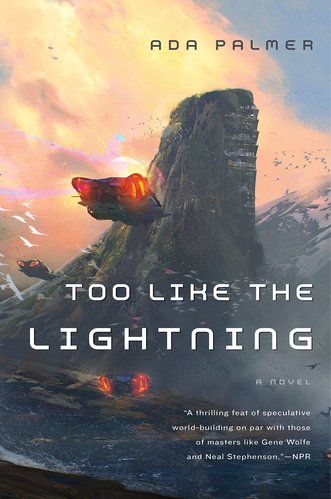 |
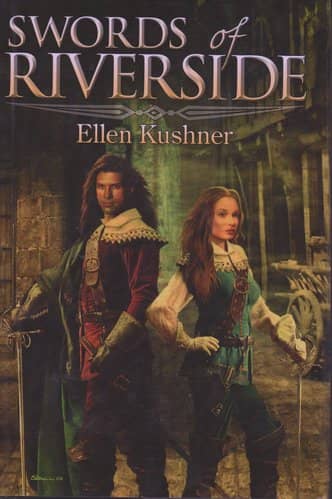 |
Best Series
I’m going to cop out just a bit and suggest that the best thing to do is look at JJ’s list of eligible series posted at File 770 here.
I’m behind in catching up with some definite candidates. As things stand now I’m most interested in nominating:
The World of Five Gods, by Lois McMaster Bujold
The Laundry Files, by Charles Stross
Riverside, by Ellen Kushner
Kylara Vatta, by Elizabeth Moon
Terra Ignota, by Ada Palmer
Best YA Novel
This is the first year for this new award. As I mentioned, it is not a Hugo, but it will be administered and awarded by the World Science Fiction Society using essentially the same process as for the Hugos (and the Campbell). The only true YA novel I read this year was Martians Abroad, by Carrie Vaughn, which I enjoyed, though I wouldn’t quite call it Hugo level work. I have just bought A Skinful of Shadows, by Frances Hardinge, on the urgent recommendation of folks like Farah Mendlesohn and others, and it looks quite interesting. Beyond that I’d suggest a look at the YA category in the Locus Recommended Reading list.
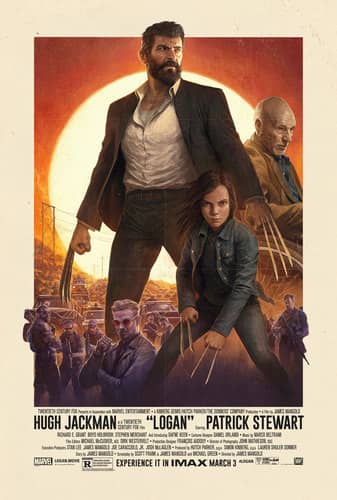 |
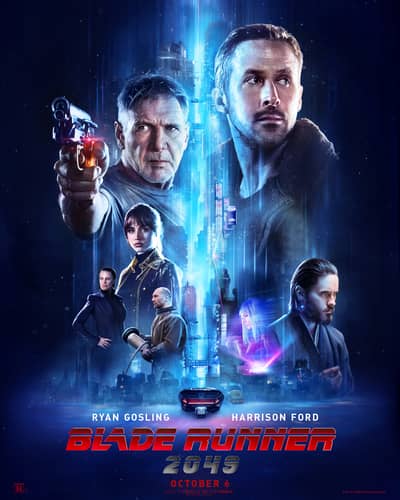 |
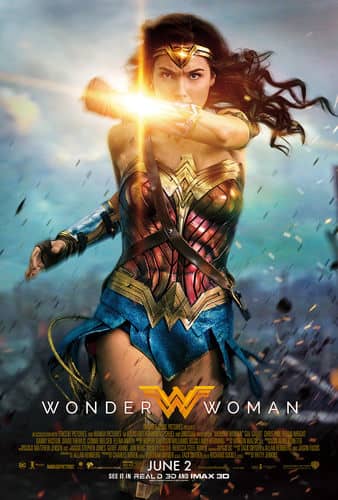 |
Dramatic Presentation
Long Form
I think this was a pretty strong year for SF movies – at any rate, there are five movies I can nominate without feeling bad. And, I should add, I don’t watch enough movies to say that there aren’t some even better ones out there. Ask Matthew Foster! (But don’t ask him about Logan – he’s just wrong about that! <g>)
My five nominees:
- The Shape of Water – clearly, of those I’ve seen, the best SF/Fantasy movie of the year. (Three Billboards Outside Ebbing, Missouri is the best movie of the year, if you’re asking.) This is a delicious hommage to – and improvement on – The Creature From the Black Lagoon and its sequels. Directed by Guillermo del Toro, and starring Sally Hawkins as a janitor who encounters the creature in a military installation, and falls in love with him. It’s a visually impressive film, and a very moving film. Some of the plot machinations are a bit creaky, sure, but the whole thing hangs together and comes to a powerful conclusion. Also features strong performances from Richard Jenkins, Olivia Spencer, and Michael Shannon.
- Logan – Possibly my favorite superhero movie ever, but I’ll concede that’s not my favorite genre. Kind of a passing the torch movie, from the, “original” X-Men to a new and different generation, and with a really powerful ending. Stars Hugh Jackman, Patrick Stewart, Dafne Keen and more…
- Blade Runner 2049 – I thought this movie was a really strong sequel to a truly great original. The future seemed a plausible future to Blade Runner, and the story was – with a couple of bumps – exciting and affecting. Harrison Ford, Robin Wright, Ryan Gosling, etc.
- Wonder Woman – Hey, I liked this movie. It was fun. It was cool to have a female superhero as the lead, and Gal Gadot did a good job. But it also had the things that annoy me about superhero movies – the abilities that always seem to scale to just what the plot requires at a given time – the exaggerated plot with exaggerated sneering villains (and, yes, Michael Shannon’s character was a bit of an exaggerated sneering villain in The Shape of Water, but his performance, and the way his character was written, transcended that) … So, fun, fine, but it’s really getting overpraised. Also starred Robin Wright (again), Chris Pine, etc…
- The Last Jedi – Fun as well, but, well, I recommend Adam Roberts’ review in Strange Horizons, which details pretty convincingly the overly silly aspects that make it just a bit too stupid. I did like Kelly Marie Tran as Rose, and Laura Dern as Admiral Holdo – it also features, of course, Mark Hamill, Carrie Fisher, Daisy Ridley, Oscar Isaac, etc. etc. – and some cute aliens.
I think The Shape of Water very clearly the best of these. There’s a gulf after that, and then Logan and Blade Runner 2049, then another gulf, and Wonder Woman and The Last Jedi. I saw a few more that weren’t as good (Guardians of the Galaxy 2, for example, was disappointing though not awful), but I’m certain I missed some interesting stuff.
Short Form
As for Short Form, I watch relatively little TV. I did see the Black Mirror episode, “U. S. S. Callister,” and I think it is definitely worthy of a Hugo nomination. I did also watch both seasons of Stranger Things, and while I tend to think of the seasons as a whole, so have a hard time choosing a specific episode, I’ll nominate episode 7 (“The Lost Sister”) and the finale, “The Gate.”
Fan Categories
In the remaining categories (as, really, with all the categories except short fiction) I do want to emphasize what may be obvious – these are people and things that I personally enjoyed, but I know there’s a lot of excellent work I’ve missed. I’ll be nominating things that impressed me, but I’ll be glad to check out the stuff other people nominate.
Best Fan Writer
The two fan writers I want to promote the most this year are a couple I mentioned last year as well: John Boston and John O’Neill. John Boston’s most publicly available recent stuff is at Galactic Journey, where he reviews issues of Amazing from 55 years ago, month by month. (It will be noted, perhaps, that I also review issues of Amazing from the same period, at Black Gate.) John’s work there is linked by this tag.
As for John O’Neill, of course his central contribution is as editor of Black Gate, for which he writes a great deal of the content, often about “vintage” books he’s found on eBay or at conventions, and also about upcoming fantasy books.
Time for just a bit of obligatory self-promotion. I am a fan writer (at least my blog writing and my stuff for Black Gate qualifies, if perhaps not my work for Locus, which I guess is now officially professional). I would note in particular my reviews of old magazines at Black Gate, particularly Amazing and Fantastic in the Cele Goldsmith Lalli era, and my various reviews of Ace Doubles (and other SF) at my blog Strange at Ecbatan (rrhorton.blogspot.com) (and often linked from Black Gate.) My blog also includes the occasional Convention Report (I did a long one on this year’s World Fantasy), and other newsy things such early versions of this exact article! I also contributed a piece to the special Journey Planet Programmatic issue guest-edited by Steven Silver. I would be greatly honored if anyone thought my work worthy of a Best Fan Writer nomination.
 |
 |
 |
Best Fanzine
As I did last year, I plan to nominate Black Gate, Galactic Journey, and Rocket Stack Rank for the Best Fanzine Hugo. I’m particularly partial in this context to Black Gate, primarily of course because I have been a contributor since the print days (issue #2 and most of the subsequent issues). Black Gate is notable for publishing a lot of content on a very wide variety of topics, from promoting new book releases to publishing occasional original and reprinted fiction to reviewing old issues of Galaxy (Matthew Wuertz) and Amazing/Fantastic/etc. (me) to intriguing posts about travel and architecture by Sean MacLachlan. Rocket Stack Rank and Galactic Journey are a bit more tightly focused: the former primarily reviews and rates short fiction, as well as assembling statistics about other reviewers (myself included) and their reactions to the stories; while the latter, as I mentioned above, is reviewing old SF magazines from 55 years past.
Finally, I’ll mention the other SF-oriented site I read and enjoy regularly – File 770, which is (deservedly) very well known, having been nominated for the Best Fanzine Hugo numerous times and having won some as well. 2018 is their 40th Anniversary! Happy Birthday!
Best Editor
Short Form
I suppose I am in a rut in this category, but I think that’s the nature of things. I will happily list the usual suspects – and I really do think they are the worthiest choices. These are, then Sheila Williams at Asimov’s, Jonathan Strahan with the Infinity series and other anthologies (including a Best of the Year series), plus stories for Tor.com), John Joseph Adams (Lightspeed, numerous anthologies, a Best of the Year series), C. C. Finlay at F&SF, Trevor Quachri at Analog, Andy Cox at Interzone and Black Static, Neil Clarke and Sean Wallace of Clarkesworld (with Neil is also editing a Best of the Year book, and Sean also co-editor of The Dark), Scott H. Andrews at Beneath Ceaseless Skies, and Lynne and Michael Damian Thomas at Uncanny. And, of course, the two most decorated contemporary editors, Ellen Datlow and Gardner Dozois. Ellen, in addition to a couple of strong horror anthologies, and some acquisitions for Tor.com, returned to her post as Fiction Editor at Omni, with one very strong issue. Gardner, besides his long-running Best of the Year series, and his work as reprint editor at Clarkesworld, edited an excellent original anthology, The Book of Swords. Each of the above is wholly worthy of a Hugo (and there are others worth consideration as well).
My choice is complicated by the fact that I consider almost every one of these people a friend, in many cases of long standing. (There are one or two I haven’t met, but I’m sure I would get along with them as well!) In addition, I have professional relationships with John Joseph Adams (as I am Reprint Editor for Lightspeed) and Sean Wallace (publisher of my Best of the Year book).
So this year I’m doing something a bit different – and perhaps unfair! I’m going to choose the editors whose publications featured the most stories in my Best of the Year book. That leaves me with C. C. Finlay (four stories from F&SF), Sheila Williams (four from Asimov’s), John Joseph Adams (three from Lightspeed), Scott Andrews (three from BCS), and Lynne and Michael Damian Thomas (three from Uncanny). (I don’t know how to separate Lynne and Michael, and of course I don’t want to!) One of the things that means a lot to me in an editor is championing new writers, and all of these editors to a great job in this area, but one who stands out to me this year is C. C. Finlay, for such writers publishing their first or second stories as G. V. Anderson, R. S. Benedict, and J. R. Dawson. (I guess with Charlie using his initials, his writers feel they need to do the same! ?)
Long Form
I am deciding on my nominees for Best Editor, Long Form on two criteria: first, involvement with some of the best novels of the year; and second, associations (especially as a leader) with new and exciting and perhaps different book lines. These criteria are obviously pretty subjective, and I have to add, my true knowledge of the real editing work done by book editors is pretty limited.
One name stands out. This is Joe Monti at Saga Press. First of all, Joe edited two of the clear cut, no fuzz, best novels of the year: Ka, by John Crowley; and The Moon and The Other, by John Kessel. Secondly, Joe is the lead editor at Saga, a fairly new imprint that has quickly made a mark, with first rate novels and anthologies. (They also produce very attractive books.) Two more choices are there partly because of their role in establishing either a new imprint, or an imprint that I feel deserves special notice. But also, in each case they have been responsible for one of the best novels of the year. These are Gavin Grant* at Small Beer Press, and John Joseph Adams, who has his own line (at Mariner Books of Houghton Mifflin Harcourt, and, no, I don’t know how to untangle that string of names). Each is responsible for at least one of the year’s top novels: The River Bank, by Kij Johnson (Small Beer) and Bannerless, by Carrie Vaughn (Mariner). (I know for a fact that John has some more really impressive books coming out in 2018 – I’ve read at least one of them already!) Another strong book from Saga Press is The Strange Case of the Alchemist’s Daughter, by Theodora Goss. The editor is Navah Wolfe. And Tor Books puts out some of the best SF every year, and I think Liz Gorinsky deserves a nod (she was the editor for Annalee Newitz’ Autonomous among other books). (Once again, some extra credit might be given for publishing first-time novelists: as with Theodora Goss and Annalee Newitz.)
(*Of course Kelly Link is also a major player at Small Beer Press, and she probably deserves as much credit as Gavin.)
I will emphasize again that my knowledge of the real work of novel editors is limited, and there are many more editors worthy of notice, most of whom are probably all but invisible to the average nominator. I could mention at least Tim O’Connell at Knopf, who edited Daryl Gregory’s Spoonbenders, Jonathan Oliver at Solaris, who edited Yoon Ha Lee’s Raven Stratagem, and Phil Jourdan at Angry Robot, who edited Tim Pratt’s The Wrong Stars.
Other Hugos
In many of these categories, I don’t really have any choices. This doesn’t mean I don’t think highly of those categories – I do! But I just can’t say much intelligent about any of them. I’ll go ahead and mention the categories anyway, for information’s sake.
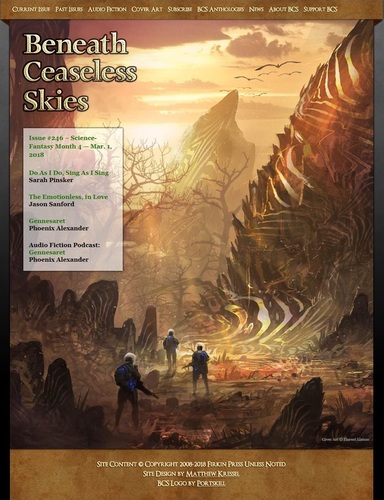 |
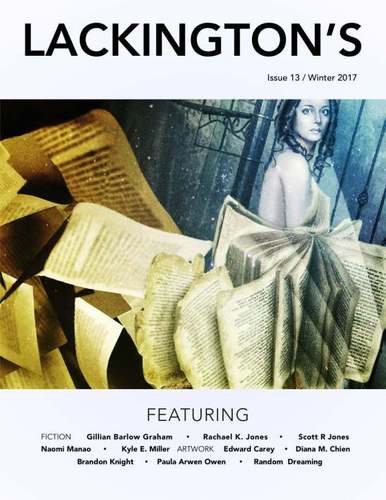 |
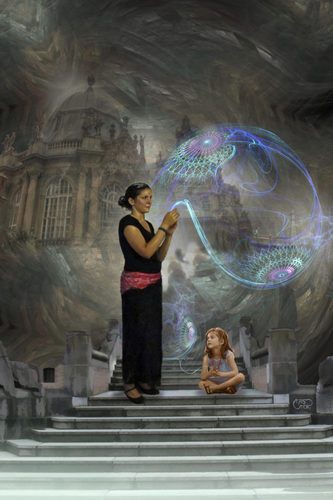 |
Best Semiprozine
I’ll nominate from the online world Beneath Ceaseless Skies, Uncanny, Lackington’s, and Kaleidotrope, as well as, from the print world, the venerable and still excellent Lady Churchill’s Rosebud Wristlet. Each of these magazines publishes fiction primarily – and excellent fiction. Most of them are pretty well known, but perhaps Lackington’s, edited by Ranylt Richildis; and Kaleidotrope, edited by Fred Coppersmith, deserved special mention because they don’t get quite as much attention.
Neil Clarke maintains a list of eligible semiprozines, here. Neil’s list still includes Black Gate, but I believe that’s more appropriately a Fanzine – it does not pay its contributors, John doesn’t make significant money from it I’m sure, and it hasn’t declared itself a semiprozine.
I should add a couple of extra particular mentions: two sites that focus on longer fiction: The Fantasist (edited by Will Waller, Evan Shiloh Adams, and Bernard Foyuth), and Giganotosaurus, edited by Rashida J. Smith.
Best Fancast
I am more or less clueless on podcasts, but I’ll mention one that I’ve enjoyed, and not only because I was the featured guest on one episode: The Literary Wonder and Adventure Show. I’ll add a long-running and always very good podcast, The Coode Street Podcast, run by Jonathan Strahan and Gary Wolfe. (I was going to be a guest on an episode of that a couple of years ago, but technical difficulties intervened.)
Best Related Work
I have one book to recommend: Paul Kincaid’s Iain M. Banks (University of Illinois Press), a very interesting and illuminating look at the career of a very significant SF and Mainstream writer.
Professional Artist
I am going to mention three new names in this category (nothing against the excellent work of previous nominees and winners such as Julie Dillon, John Picacio, and Galen Dara, who surely still deserve consideration). But these are three folks who did some very nice work and who haven’t previously been nominated.
- Kathleen Jennings – I saw two lovely covers from her this year for Small Beer Press books: Telling the Map, and The River Bank. Not traditional SF illustration – which is not at all a bad thing! She has got notice in the past as a World Fantasy Award artist nominee. And she’s a very good writer: I used her story “Skull and Hyssop” in my 2015 Best of the Year volume. A portfolio is here.
- Gregory Manchess – He was the Artist GOH at World Fantasy this year, and I was really impressed by his work displayed there. He wrote an illustrated novel, Above the Timberline, published in 2017, which I have not read, but, again, the illustrations I’ve seen from it are very good indeed. Samples of his work can be found here.
- Dave Senecal – Senecal did some intriguing covers for Interzone this year, which attracted my attention. A Google search also found some interesting work based on Lovecraft, and lots more stuff, not necessarily SF of Fantasy-oriented. But the Interzone pieces themselves are well worth a look. (NOTE: JJ at File 770 informs me that by the WSFS rules, Interzone is a semiprozine, which makes Senecal’s work for it eligible in the Fan Artist category instead of Pro Artist.)
Fan Artist
Here’s a category I’m going to bow out of – I just haven’t seen enough fan art this year to make a recommendation. (With the exception of Dave Senecal, as noted above.)
Best Graphic Story
And one more I’ll bow out of – I don’t read graphic novels as a rule. Don’t take that as disparagement – I’m really impressed by the artwork and storytelling, but it’s a case of “so many books, so little time”…
Campbell
The John W. Campbell Award for Best New Writer, also “Not a Hugo.” This is given to the best writer whose first professional publication in the SF or Fantasy field appeared in the past two years (2015 or 2016). Writertopia has a page, not guaranteed to be complete, with a list of eligible authors.
I went through that list and came up with the following writers who have done something that impressed me:
G. V. Anderson (who already has a World Fantasy Award!)
R. S. Benedict
J. R. Dawson
Giovanni di Feo
Tonya Liburd
Benjamin C. Kinney
Finbarr O’Reilly
Vina Jie-Min Prasad
Rebecca Roanhorse
D. A. Xiaolin Spires
Interestingly, I don’t think any of these have published novels, and in fact I didn’t recognize a novelist among all the eligible writers listed. (Probably there were some, but I hadn’t seen their novels.) Typically novelists have an advantage. Maybe this year will be different.
Three of these writers have stories in my Best of the Year book this year: J. R. Dawson (“Marley and Marley), Giovanni di Feo (“Ugo”), and Vina Jie-Min Prasad (“Fandom for Robots,” not to mention “A Series of Steaks”). I will certainly happily nominate them. I will also add R. S. Benedict, whose “My English Name” is very impressive, and was definitely on my short list of stories to consider for my book this year, and G. V. Anderson, whose “I Am Not I” was also on my short list, and who should be remembered for other strong work, including last year’s World Fantasy Award winner for Short Fiction, “Das Steingeschöpf.”
Nominations for the 2018 Hugo Awards and 1943 Retrospective Hugo Awards are open to anyone who was a voting member of the 2017, 2018, or 2019 Worldcons as of December 31, 2017. Nominations must be received by 11:59pm Pacific Daylight Time on Friday March 16, 2018 (6:59am UTC on Saturday, March 17, 2018. Get more information and register to vote (membership cost involved) here.
Rich Horton’s last article for us was a Retro Review of the December 1961 issue of Amazing Stories. His website is Strange at Ecbatan. See all of Rich’s articles here.

Nice nominations on your list!
One thing to keep in mind: Charlie Stross asked people not to nominate him for the Series Hugo this year.
I would love to see a nomination for Black Gate! 🙂
We’ve been nominated twice before, and declined both times. I admit it might be nice to be nominated under circumstances we could stomach. 🙂
Thanks for the recommendation of Literary Wonder & Adventure Show as Best Fancast! Edgar the Raven is very happy!